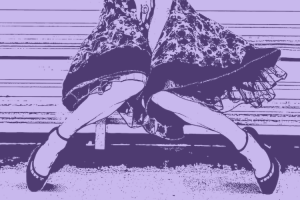Celia: Hey y’all. This is another video in a series I’m doing with Everyday Feminism, which is a website dedicated to helping you break down and stand up to everyday oppression. In this video, I want to talk about some of the ways that I’ve internalized mental health stigma. Specifically, I want to focus on my internalizing of stigma directed toward people with anxiety and depression, as that’s what I struggle with.
I’m going to go over five common feelings that I have that are a result of this internalization. The first one that I want to go over is feeling like I’m not trying hard enough or like I’m not doing enough to fix myself. I know that my depression and anxiety aren’t going to be fixed, but I find myself feeling like if I only did more, I might be more normal in some way. If I only exercised more or ate better or socialized more, I would somehow overcome my problems.
The issue is that these kinds of fixes can’t actually change what is chemically determined about me. They can affect me, sure, but ultimately, my mental illnesses are a product of some chemical imbalance in my brain, and actually, I do take care of myself. I’m on antidepressants. I try my best to live a healthy lifestyle by getting enough sleep, maybe too much sometimes, eating healthy, things like that.
Basically, I think I’m doing all right with managing my anxiety and depression. I think I’m too hard on myself, because I’m constantly being reminded of how I could be doing more, like when people say, “Oh, have you tried yoga?”
It’s like, “Yes, I have. Yoga is great. It’s very relaxing. It doesn’t cure anxiety disorders.” I need to remind myself that I can’t do every possible thing that might help me, and the reminder is from well-meaning people suggesting new ways that I can try to fix what’s wrong with me just end up making me feel like I can never do enough.
The second feeling that I struggle with is related, and that is the feeling like I need to be fixed at all. I’ve had an anxiety disorder since I was nine years old. I don’t think that it’s going anywhere. My dad also struggles with a lifelong anxiety disorder. He’s still dealing with it. I think it’s a part of me. It’s a shitty complicated neurotic part of me, but it’s still part of my identity.
Even if I would rid myself of it if I had the choice, the fact is that I don’t have that choice. I probably never will, so focusing on being fixed is really not a healthy place for me to focus. Instead, I should focus on being happy, or being as happy and carefree as an anxious, depressed person can be. I don’t need to be fixed. This is a message that I’ve internalized from years of feeling like there’s something wrong with me.
The third feeling that I have is feeling like I’m a burden to those that I care about. It’s one thing to come to terms with how mental illness affects you. It’s an entirely different thing to come to terms with how your mental illness affects those you love, so my depression can turn me into a bag of rocks, just heavy, stationary, not very useful, not very fun.
The difference between me and a bag of rocks is that I complain and cry a lot more, so as you can imagine, this can put a strain on people who are tasked with looking after me when I’m in my really lowest points. I don’t expect this of people, but I have a lovely partner and family who do support me when I’m at a low point. It’s hard, though, not to feel like I’m a burden to them. It’s easier to feel like I’m a bag of heavy rocks that they have to drag around with them everywhere.
I’m cared for because when I’m in a good place, I take care of others who need it. I take care of my family and friends when they’re in a bad place and I’m able to. I have never felt like they were a burden to me, and so I try to remind myself that I am similarly not a burden to them. I’m not a burden because I’m a person and I’m deserving of care when I’m at my most vulnerable, and so are you, so we need to remind ourselves of that.
The fourth feeling that I deal with is feeling like because other people have it worse, somehow I’m just being overdramatic and what I’m dealing with isn’t actually that bad. Basically, I doubt the seriousness of my illness, because in other ways, I have it easy. In a lot of ways, I’m very privileged. Not only am I white, cisgender, middle class, educated, able-bodied, and so on, I’m also surrounded by a supportive family and a loving partner. I have a very good setup. I’m very lucky, but I still struggle.
Going to a small private Jewish school as a kid didn’t stop me from having daily panic attacks because of some spontaneous school phobia I developed that then developed into generalized anxiety disorder. Living in England with my boyfriend to do my master’s didn’t stop me from becoming severely depressed and unable to function normally for months. You can have privilege, you can have a nice life, and still be depressed and still be anxious. These are disorders of the brain on a chemical level, so they should be treated like any other medical problem.
If you found out you had a heart problem, you wouldn’t question it like, “But I have such a nice home life, such nice parents. I must be overreacting. There’s no way that I could have a heart problem when I’m privileged in so many ways.” It sounds absurd, and that’s because it is. Mental illness affects all kinds of people. We’re not being overdramatic just because we have it good in other ways.
The last feeling that I want to talk about is feeling like a bummer. Basically, I’ve internalized the feeling that I’m just no fun because of my mental illnesses. Even when I’m not depressed, my anxiety makes me feel the need to plan everything ahead of time, and in somewhat ridiculous detail, so I need to know how things will unfold and when I’ll be able to leave a situation, or I feel incredibly anxious going into that situation. I don’t love surprises. I don’t like to wing it. I like to plan. I like to stay on schedule, and I hate being late.
I’m kind of boring in a lot of ways, and in a lot of ways, I think my anxiety makes me less spontaneous and exciting. It’s easy for me to focus on this, especially after a particularly anxious episode, things not going according to plan can feel very catastrophic to me, and while in the moment, I feel totally justified in freaking out about some kind of change in plan, in hindsight, I often feel ashamed and embarrassed about it. I feel embarrassed because I feel like I’m not able to let loose like other people, and I just feel like I’m never carefree, like what even is that feeling?
This is a shitty way to feel about yourself, but I know that in reality, I’m much more than my mental illnesses, and even more than that, my illnesses do more than just weigh me down. Because of my anxiety, I’m an excellent planner. I plan all the trips I take with my partner down to writing out every train time and every address. Because of my depression, when I do feel like doing something fun, I appreciate it a lot more.
I know that what makes me a bummer sometimes also shapes me and shapes who I am in a lot of other important ways, so what if I’m not always fun? What if I’m not always or ever the life of the party? I hate parties, anyway. I’m fun in my own ways, so the message here is to embrace your own happiness wherever you find it and for as long as you can hang onto it.
I hope that these these feelings were relatable to some of you, and I hope that you find some comfort in knowing that you’re not alone in feeling these things. These are messages we’ve internalized about our struggles, and you should know that that does not make them true, and that we can work against them in our own minds, and I hope that this helped you do that. I’ll see you in my next video.



















